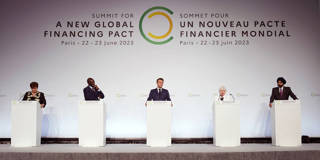The biggest problem with global climate finance today is that only a small share of it goes to developing countries. Far more must be done to create a better working relationship between multilateral development banks and the major private investors that hold the key to closing the financing gap.
BEIJING – Although French President Emmanuel Macron’s recent Summit for a New Global Financing Pact produced a “roadmap” toward reforming the global financial system, the proposed reforms are unlikely to mobilize private capital at the scale required to mitigate climate change. A key reason for this is that the roadmap largely fails to address the barriers that prevent pension funds and other large institutional investors from joining forces with multilateral development banks (MDBs). While proposed provisions to increase foreign-currency guarantees and pool currency risks are helpful, they are unlikely to be sufficient.

BEIJING – Although French President Emmanuel Macron’s recent Summit for a New Global Financing Pact produced a “roadmap” toward reforming the global financial system, the proposed reforms are unlikely to mobilize private capital at the scale required to mitigate climate change. A key reason for this is that the roadmap largely fails to address the barriers that prevent pension funds and other large institutional investors from joining forces with multilateral development banks (MDBs). While proposed provisions to increase foreign-currency guarantees and pool currency risks are helpful, they are unlikely to be sufficient.